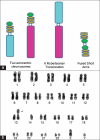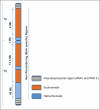Genetic and epigenetic factors: Role in male infertility
- PMID: 21716934
- PMCID: PMC3114572
- DOI: 10.4103/0970-1591.78436
Genetic and epigenetic factors: Role in male infertility
Abstract
Genetic factors contribute upto 15%-30% cases of male infertility. Formation of spermatozoa occurs in a sequential manner with mitotic, meiotic, and postmeiotic differentiation phases each of which is controlled by an intricate genetic program. Genes control a variety of physiologic processes, such as hypothalamus-pituitary-gonadal axis, germ cell development, and differentiation. In the era of assisted reproduction technology, it is important to understand the genetic basis of infertility to provide maximum adapted therapeutics and counseling to the couple.
Keywords: Azoospermia; DNA damage; Y chromosome; cytogenetic; epigenetics; infertility; mRNA; mtDNA; oligozoospermia.
Conflict of interest statement
Figures



Similar articles
-
Genetics of human male infertility.Singapore Med J. 2009 Apr;50(4):336-47. Singapore Med J. 2009. PMID: 19421675 Review.
-
Meiotic recombination: insights into its mechanisms and its role in human reproduction with a special focus on non-obstructive azoospermia.Hum Reprod Update. 2022 Nov 2;28(6):763-797. doi: 10.1093/humupd/dmac024. Hum Reprod Update. 2022. PMID: 35613017 Review.
-
Cytogenetic and Y chromosome microdeletion screening studies in infertile males with Oligozoospermia and Azoospermia in Southeast Turkey.J Assist Reprod Genet. 2008 Nov-Dec;25(11-12):559-65. doi: 10.1007/s10815-008-9272-8. Epub 2008 Oct 25. J Assist Reprod Genet. 2008. PMID: 18953646 Free PMC article.
-
An analysis of Y-chromosome microdeletion in infertile Korean men with severe oligozoospermia or azoospermia.Investig Clin Urol. 2024 Jan;65(1):77-83. doi: 10.4111/icu.20230141. Investig Clin Urol. 2024. PMID: 38197754 Free PMC article.
-
Chromosomal abnormalities and Y chromosome microdeletions in infertile men with azoospermia and oligozoospermia in Eastern China.J Int Med Res. 2020 Apr;48(4):300060519896712. doi: 10.1177/0300060519896712. Epub 2019 Dec 29. J Int Med Res. 2020. PMID: 31885309 Free PMC article.
Cited by
-
PRM1 Gene Expression and Its Protein Abundance in Frozen-Thawed Spermatozoa as Potential Fertility Markers in Breeding Bulls.Vet Sci. 2022 Mar 3;9(3):111. doi: 10.3390/vetsci9030111. Vet Sci. 2022. PMID: 35324839 Free PMC article.
-
The Nsun7 (A11337)-deletion mutation, causes reduction of its protein rate and associated with sperm motility defect in infertile men.J Assist Reprod Genet. 2015 May;32(5):807-15. doi: 10.1007/s10815-015-0443-0. Epub 2015 Feb 22. J Assist Reprod Genet. 2015. PMID: 25702163 Free PMC article.
-
A Comparative Cross-Platform Analysis to Identify Potential Biomarker Genes for Evaluation of Teratozoospermia and Azoospermia.Genes (Basel). 2022 Sep 25;13(10):1721. doi: 10.3390/genes13101721. Genes (Basel). 2022. PMID: 36292606 Free PMC article.
-
Human testis-expressed (TEX) genes: a review focused on spermatogenesis and male fertility.Basic Clin Androl. 2021 Apr 22;31(1):9. doi: 10.1186/s12610-021-00127-7. Basic Clin Androl. 2021. PMID: 33882832 Free PMC article. Review.
-
Male Fertility as a Proxy for Health.J Clin Med. 2024 Sep 19;13(18):5559. doi: 10.3390/jcm13185559. J Clin Med. 2024. PMID: 39337044 Free PMC article. Review.
References
-
- Yoshida A, Miura K, Shirai M. Cytogenetic survey of 1,007 males. Urol Int. 1997;58:166–76. - PubMed
-
- Dada R, Kumar R, Shamsi MB, Tanwar M, Pathak D, Venkatesh S, et al. Genetic screening in couples experiencing recurrent assisted procreation failure. Ind J Biochem Biophys. 2008;45:116–20. - PubMed
-
- Dada R, Kumar R, Shamsi MB, Kumar R, Kucheria K, Sharma RK, et al. Higher frequency of Yq microdeletions in sperm DNA as compared to DNA isolated from blood. Asian J Androl. 2007;9:720–2. - PubMed
-
- Selice R, Di Mambro A, Garolla A, Ficarra V, Iafrate M, Ferlin A, et al. Spermatogenesis in Klinefelter syndrome. J Endocrinol Invest. 2010;33:789–93. - PubMed

